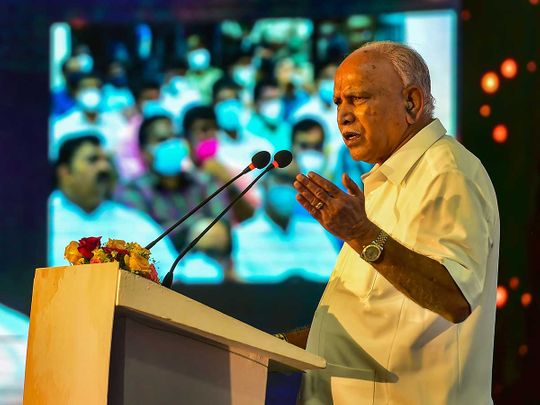
In India, finally BS Yediyurappa, 78, multiple-term Chief Minister (CM) of Karnataka gave in to the demands of the top leadership in Bharatiya Janata Party (BJP) and resigned from his dream job.
From being the solitary man who carried the saffron flag in Bengaluru and grew the BJP in the south, giving it an entry in Karnataka, Yediyurappa was finally reduced to be the pre-eminent leader of Lingayats (his caste group), who have been protesting his exit all of last week.
The drama played out in public as Yediyurappa, always a firebrand when it came to his boundless appetite for the CM’s job, seemed to throw in the towel — much like an old boxer wearying from repeated punches.
The BJP “high command” which now resembles the Congress “high command” at the height of its power had decreed a “generational change” in Karnataka.
The “change” is backgrounded in the boundless ambitions of B L Santosh, currently BJP’s general secretary (organisation) and formerly an RSS apparatchik. On the foreground is the age bar which Narendra Modi and Amit Shah have imposed on BJP 2.0. Leaders past the age of 75 are not given active political roles.
BJP’s succession plan
Yediyurappa has at least managed to ensure that his “succession plan” is managed. Close political confidante, Shobha Karandlaje, has been accommodated in the Modi cabinet and both of Yediyurappa’s sons Raghavendra and B V Vijayendra will be accommodated in the party and in the government of his successor.
“Dynasty is nasty” as Venkaiah Naidu once memorably put it, is no longer the case in BJP.
The central BJP was braced for some sort of a revolt from Yediyurappa, who had even quit the BJP in the past when he was asked to resign as CM on alleged corruption allegations. This time around, the exit was tame. Perhaps Yediyurappa no longer had the stomach for rebellion.
The electoral maths is also inexorable. BJP, which commands the majority Lingayat support, is not expected to go below 80 seats in the Karnataka assembly (the state assembly comprises of 224 seats). The Congress is likely to hold on to its 70 seats and the Janata Dal Secular to 20.
Essentially the fight is for the remaining 55 seats and the BJP, with its boundless war chest, has an edge here.
Not hard-core Hindutva
Yediyurappa has been facing constant attrition from Santosh, who is a Brahmin without any mass base in Karnataka. Santosh has encouraged something called a “CD war" against Yediyurappa.
The RSS, the mother ship of the Sangh, has never been comfortable with Yediyurappa as he doesn’t conform to the “Hindutva” hardline, the Sangh now sets as the benchmark for the BJP leaders it nurtures.
In Karnataka, Yediyurappa (BSY as he is universally called) is not considered an extreme Hindutva leader, but more of a strong caste leader of Lingayats.
The corruption allegations, which have dogged BSY and his dealings with the Bellary brothers, also makes the RSS uncomfortable. The RSS is determined on a purge in Karnataka and MLAs who defected to bring down the previous Congress-JDS coalition government may be the worst affected.
The turncoats will head for a safer political harbour as whoever replaces BSY will be the BJP leader in the cookie-cutter mould of the new BJP.
The prototype is M L Khattar in Haryana, a CM serving wholly at the pleasure of Modi and Shah, who has no pretensions to being a mass leader like BSY or Vasundra Raje in Rajasthan who the central BJP is also looking to cut to size.
End of an era
The buzz word is “young leader” that the BJP is trying to push for in Karnataka. It is convincing the Lingayats to come on board with the idea. With BSY being allowed to quit on his own timetable, upset Lingayats may come around.
It’s literally the end of an era as BSY exits the scene. Yediyurappa was the first BJP leader who managed to give the Saffron party an entryway in to the south of India, where it still meets huge resistance.
BSY first became CM in the less doctrinaire era of Atal Bihari Vajpayee. Even then BSY was always a rebel, always conscious of his status as a mass leader, who could not be trifled with.
The corruption scandals that dogged his years in office were relentless and rivals in the BJP always accused him of perpetuating family rule and benefiting cronies. The criticism from the Sangh was relentless.
This time around, BSY who had formed his government with defectors was made uncomfortable from day one repeatedly taking central permission to expand his cabinet. Yediyurappa aide, Shobha Karandlaje, moving to the Modi government was hint that BSY had agreed to go quietly.
Rebellion and old age don’t go together.









